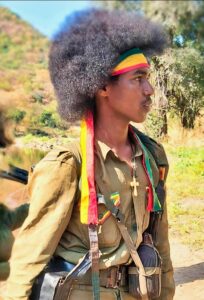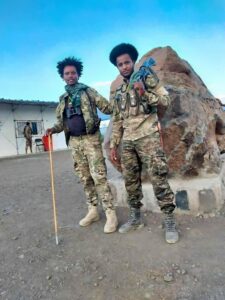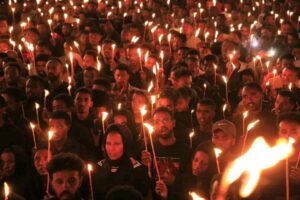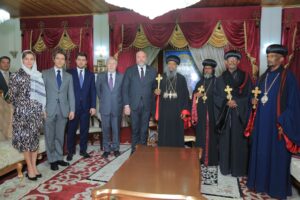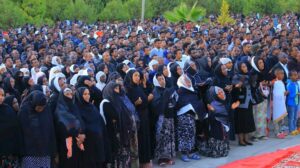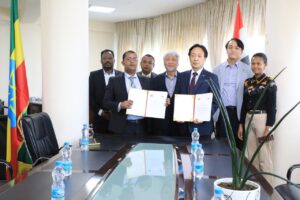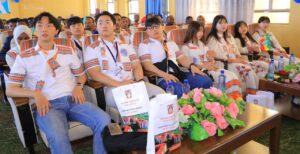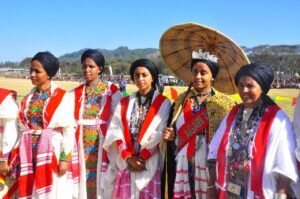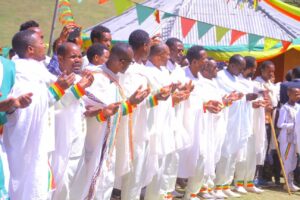Ethiopia › Forums › Ludicrous World › Tigray People’s Liberation Front (TPLF) › Hundreds of thousands of people are displaced as fighting continues
Hundreds of thousands of people are displaced as fighting continues
Hundreds of thousands of people are displaced as fighting continues between government forces and the Tigray People’s Liberation Front in northern Ethiopia, threatening the stability of a volatile region. Cameron Hudson, senior fellow at the Atlantic Council’s Africa Center and former director for African affairs at the National Security Council joins to discuss the conflict and its impact.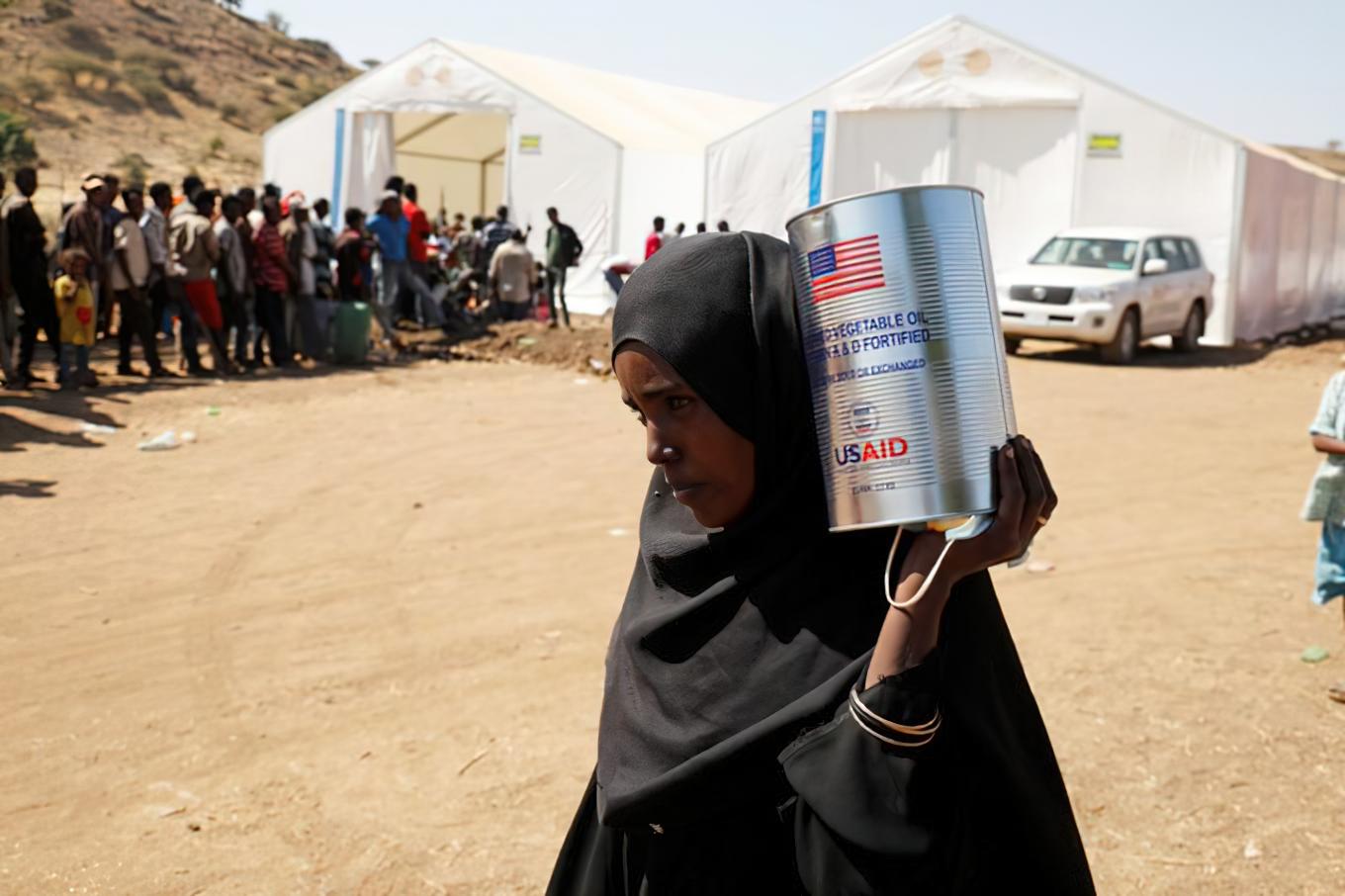
Hari Sreenivasan:
For more on the continuing conflict in Ethiopia and the impact it is having on the region, I spoke with Cameron Hudson, a senior fellow with the Atlantic Council’s Africa Center and former Director for African Affairs at the National Security Council during the George W. Bush administration.
Cameron, we’ve been reporting on the momentary kind of strife that’s been happening on a weekend by weekend basis, but if you could explain for us, put this in perspective, what is the conflict about?
Cameron Hudson:
Well, the conflict is really about kind of ethnic federalism.
Ethiopia is made up of 10 different ethnic regions and a lot of autonomy has been devolved down to that regional level. And as part of Prime Minister Abiy’s kind of overall democratic reform process, he really sought to erase a lot of those ethnic differences in the country and promoted a kind of pan-Ethiopian nationalism, almost. And I think what you’re seeing here, certainly in the Tigray region, which is traditionally where the power center has been in the country, is a feeling that they have been sort of capsid in the political process in the country. And you’re seeing now a kind of more formalized agitation for a return to kind of ethnic federalism and the promotion of ethnic rights. And so, it is really part of a democratic reform process that Abiy has been undertaking, but which probably hasn’t had enough buy in from all of these ethnic minorities across the country.
Hari Sreenivasan:
I mean, this is a person who won a Nobel Peace Prize. Yet here he is, part of a conflict that has displaced hundreds of thousands of people.
Cameron Hudson:
The Nobel Prize was obviously for an international effort to heal wounds of the war with Eritrea, which took place in the late 1990s. What we’re seeing now, though, is Eritrea, as the partner in peace, may have now become the partner in war.
We have seen cooperation between Ethiopia and Eritrea and even the active involvement of the Eritrean forces in this conflict in Tigray. And so I think that with respect to the Nobel, people are asking whether it was premature. I think it was a kind of a hoped-for movement in a direction of peace. But what we’re seeing is his effort to make peace with Eritrea is not a reflection on his tactics domestically.
Hari Sreenivasan:
What are the consequences for the countries surrounding this region as displaced people start to head for those borders?
Cameron Hudson:
Well, it’s huge.
I mean, you cannot underestimate the, frankly, the beneficial role that Ethiopia has played in the region. It is the largest provider of peacekeeping forces on the continent of Africa, and it has played an essential role in conflicts in Somalia and Sudan in recent years. It is the largest provider of peacekeepers in the Somali conflict, which we as a US government have spent billions being a part of and trying to stabilize that country.
We’re on the precipice of seeing Ethiopian troops completely withdrawn from that theater in advance of of elections there. Obviously, they’ve also been a major peacemaker and mediator in conflicts in both Sudan, the revolution, the democratic revolution that’s been going on there and the civil conflict that took place in South Sudan just a few years ago.
So if we see Ethiopia move from the traditional role of peacemaker and mediator to a net exporter of instability, then you could see an entire region really, really destabilized going forward.
Hari Sreenivasan:
Tell me a little bit about the humanitarian crisis that happens when all these people leave their homes.
Cameron Hudson:
Well, right now, it’s really hard to assess the degree of the humanitarian crisis because the region has been so cut off to outside humanitarian assistance and even communications. So even though this week the U.N. reached an agreement with the Abiy government to allow humanitarian access into the region, we’ve seen that fighting up until today, up and through today, has really prevented those assessment missions from even getting eyes on the situation.
But we do know that even before this conflict started, this was an incredibly insecure region. As much as 20 percent of the population was food insecure, there were over a hundred thousand internally displaced — there are estimates now that there are a million internally displaced people.
We really only have access to about the 50,000 or so that have crossed the border in the last few weeks into Sudan. But when we know that there are pockets of of internally displaced that we are not able to access and the fears are growing, that those are populations that were surviving on international assistance, that international assistance has been cut off for the last month of fighting. And so we really don’t know what we’re going to find when we’re finally able to access those areas.
Hari Sreenivasan:
If the fighting officially comes to an end, does that mean that the forces that are in opposition just literally head for the hills and fight from there?
Cameron Hudson:
Well, that seems to be what’s happening right now. I mean, last weekend there was this very tense standoff around the regional Tigrayan capital of Mekelle, which was encircled essentially by federal government troops. The siege of Mekelle never happened because the Tigran leaders and have fled into the mountains surrounding the region.
I think we have to recall Ethiopia’s recent history. It fought a very long war against a communist Derg where the TPLF, the Tigrayan Party, essentially led a counterinsurgency campaign from the hills to overthrow this communist regime. And so I think there’s a great fear that they’re going to kind of return to their roots and not fight a conventional fight against federal government forces, but instead go to the mountains and try for a sort of asymmetrical warfare. And in that case, it might not be limited to the Tigray region. You could see conflict spilling over into other parts of the country, trying to draw in these other ethnic groups into the fight that they have started.
Hari Sreenivasan:
Cameron Hudson, thanks so much for joining us.
Cameron Hudson:
Thank you.
Ethiopia Autonomous Media


